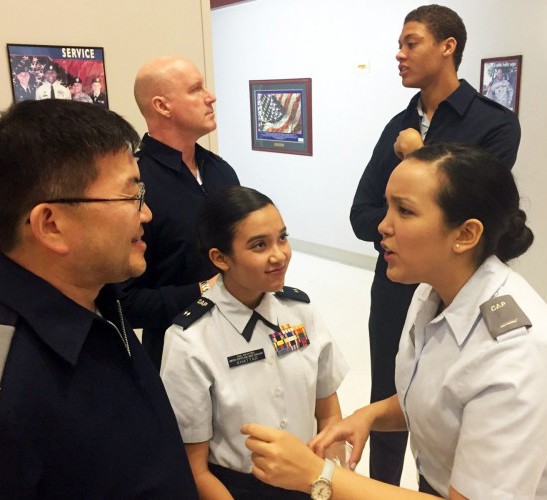Pacific Region's Ishikata Endorses CAP Push for Diversity, Inclusion: ‘Everyone Needs to Be Involved’
Civil Air Patrol recognizes Asian American Pacific Islander Heritage Month with a profile of Col. George Ishikata, commander of the Pacific Region.
Cadet Maj. Elise Ferreria
Renton Composite Squadron
Washington Wing

 Col. George Ishikata’s experiences as a Japanese American have helped shape his views on not only challenges and opportunities but also Civil Air Patrol’s continuing campagin for diversity.
Col. George Ishikata’s experiences as a Japanese American have helped shape his views on not only challenges and opportunities but also Civil Air Patrol’s continuing campagin for diversity.
The six months he’s served so far as commander of the Pacific Region have capped a CAP career that began when he joined the California Wing’s San Francisco Cadet Squadron 86 as a cadet in June 1977. While attending a wing encampment, the 15-year-old developed a deep interest in the military. He followed up by joining Army Junior ROTC at his high school.
Between CAP and Junior ROTC, Ishikata decided to become an officer in the military, so he cross-enrolled in Army ROTC at the University of San Francisco while attending  San Francisco State University. A full Army career followed, as he became a military police officer and then a military intelligence officer before ending his career at the Pentagon in the Office of the Undersecretary of Defense for Intelligence.”
San Francisco State University. A full Army career followed, as he became a military police officer and then a military intelligence officer before ending his career at the Pentagon in the Office of the Undersecretary of Defense for Intelligence.”
He retired as an Army colonel in 2015, having remained the entire time in the same CAP squadron he joined as a cadet.
CAP squadron he joined as a cadet.
Throughout his service in the military and in CAP, Ishikata’s Asian heritage has remained an integral part of his life. “People are a product of their experiences,” he said, adding that while those experiences can be good or bad, all add up to create the individual’s outlook on the world.
On one hand, those experiences create a bond between himself and fellow Asians, said Ishikata, whose family was among the approximately 120,000 Japanese Americans incarcerated in U.S. internment camps during World War II. On the other hand, being part of a minority community carries its own challenges.
Many times, he said, he has borne the brunt of a racist joke and encountered more subtle forms of discrimination. He has faced stereotypes of being the “smart guy,” the “math guy” and the “technical whiz.”
He also has been overlooked, seen as someone who couldn’t take charge in a leadership position because he is Asian, Ishikata said. He has been pigeonholed into equal opportunity officer positions, often noticing he’s the only Asian individual around, feeling isolated and alone.
Even so, he’s succeeded. And he hopes to see others do the same.
Diversity in CAP has increased considerably since the time Ishikata was a cadet, and attitudes have improved as well. He hopes diversity in the organization’s ranks will soon reflect national numbers and feature more representation in high-level leadership positions.
It sends a message, he said: “If they can do it, I can do it!”
Ishikata is optimistic for the future. “CAP has embraced the concept of diversity and inclusion,” he said, and he feels the best way to tackle these challenges is diversity and inclusion.
“Having diversity makes units better, and it makes units proud,” he said.
“When you don’t have enough diversity, you base your responses on things that you’ve heard, things that you may not know … we need to have more diversity so we can better understand what people are going through,” Ishikata said.
“Diversity is key. … Everyone needs to be involved [in working toward it]. We’re a stronger organization when all of us are working together,” he said.
Ishikata hopes his position as Pacific Region commander helps all members from minority groups feel represented and able to achieve great things despite challenges they may face.
“My message to our cadets and seniors is multifaceted: First, I want to thank them for all they do for CAP and others. I don’t think they get enough appreciation for the hard work they do.
“Second, I want to let them know anything is possible. My appointment is an example of this: an endorsement that CAP is a diverse, rich, fair organization, which has infinite possibilities for everyone.“Third,” he said, “never give up. The persistence and grit that our members possess is critical to getting done all the things we do … It’s important that we keep it up.”


